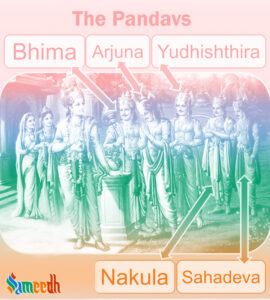The Pandavs are central characters in the Indian epic, the Mahabharat. The Mahabharat is one of the two major Sanskrit epics of ancient India, the other being the Ramayan. It is an epic narrative of the Kurukshetra War and the fates of the Kaurav and the Pandav princes.

The Pandavas are five brothers—Yudhishthir, Bhim, Arjun, Nakul, and Sahadev—born to Queen Kunti and gods. Each brother has a unique set of skills and characteristics.
- Yudhishthir: The eldest Pandav, known for his righteousness and commitment to truth. He is also known as Dharmaraja, meaning the king of righteousness.
- Bhim: The second Pandav, renowned for his immense strength. He is a powerful and formidable warrior on the battlefield.
- Arjun: The third Pandav and one of the most skilled archers in the world. Arjun is a central figure in the Mahabharat, especially in the Bhagavad Gita, a sacred text that is part of the Mahabharat.
- Nakul and Sahadev: The youngest of the Pandavs, known for their beauty. Nakul is a skilled swordsman, and Sahadev is knowledgeable in astrology.
The story of the Mahabharata revolves around the conflict between the Pandavs and their cousins, the Kauravs, over the throne of Hastinapur. The great war of Kurukshetra is the climax of the epic, where the Pandavs fight against the Kauravs to establish their rightful place in the kingdom. The Bhagavad Gita, a philosophical and spiritual discourse, is a part of the Mahabharat and is delivered by Lord Krushna to Arjun on the battlefield before the war begins.